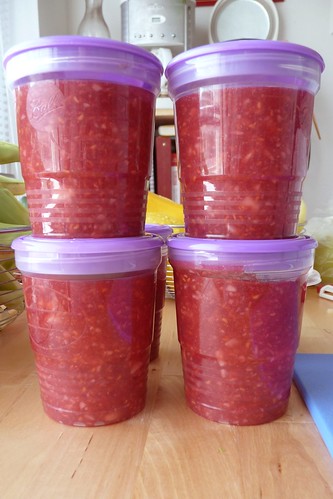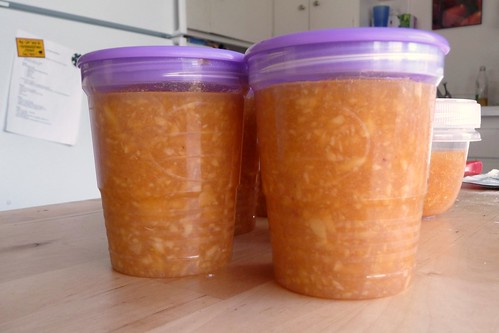No-Cook Freezer Jam

I spent my weekend preserving, how about you? Canning season is well under way here in Utah, as everyone, it seems, tries to take advantage of the great harvest. Utah farms produce an astonishing amount given our location on high desert steppes, everything from peaches and cherries to cucumbers, squash, tomatoes and peppers.
Of course, fruit preserves are some of the most popular, along with salsa and corn. But I had no idea freezer canning was so damn simple! (Regular canning is fairly scary to a canning newbie like me.)
Our local grocery is having a major fruit sale - 99c for a pint of raspberries! 39c a pound for pears! - so we decided to look up some simple freezer jam recipes. (We have this half-full freezer after all.)
We picked up a flat of raspberries (12 6-ounce containers), several pounds of pears and peaches, some freezer pectin and sugar. My goals: Put up raspberry preserves (my favorite), pear preserves, raspberry-pear preserves and peach preserves.
Originally, I was going to use recipes I found online, but after reading the back of the pectin package, I used Ball's recipe instead. I'd trust them with my canning life, they've been around forever and almost everybody uses or has used their recipes or equipment.
The formula is dead simple and works for a lot of different fruit. We prefer a semi-chunky preserve, so fruits that don't crush well went in the food processor for a quick whiz around. I don't know if using a processor is really advised, but it was certainly easy. Otherwise, we used a "stomper", a Latvian-style wooden masher, to crush everything.
According to Ball, 4 cups of crushed raspberries is roughly 6 6-oz containers. What do you know, they're right! It was a little over, but not by much. It worked out to about 2 1/4 pounds raspberries to 1 pound sugar, and when we asked my mother-in-law about her ratio, it's almost dead on for hers. (I absolutely ADORE her raspberry jam. She makes it with fresh-picked raspberries from the forest near her house in the Latvian countryside. It is to die for and I've begged her for jars every time I go to Latvia.)
Now, these preserves are very fresh and spreadable, so only use absolutely ripe fruit. Canning fruit is usually blemished and banged up, but the flavor is the only thing that matters. The pears this week on sale were superb, if they weren't very pretty.
Ball advises that 4 lbs of strawberries is about 4 cups, but alas, strawberry season is over so we can't make my husband's beloved strawberry-rhubarb preserves.
We couldn't resist having crepes the next day to use up the remnants of our preserve-making binge, too! Mmm.. fruit-filled crepes.
There's still time to put up some jam if you have some extra freezer space. And, not to sound like a total shill for Ball, but their plastic freezer jam jars are really handy and easy to store.
No-Cook Freezer Jam [printable recipe]
From Ball
Works great for: Raspberries and other berries, apricots, cherries, grapes, pears, plums and "most other tender fruit"
Yield: 5 - 6 8-ounce containers
- 4 cups crushed fruit
- 1 1/2 cups (~1 lb) sugar
- 1 1.59-oz package Ball No-Cook Freezer Pectin
Stir together sugar and pectin thoroughly. Add fruit and mix for 3 minutes. Ladle into clean jars or freezer containers and let set for 30 minutes. Freeze or refrigerate.
Lasts: 3 weeks in the fridge, 1 year in the freezer
No-Cook Peach Freezer Jam [printable recipe]
From Ball
Yield: 5 - 6 8-oz containers
- 4 cups (about 12) peaches, peeled and crushed
- 1 1/2 cups (~1 lb) sugar
- 3 tbsp lemon juice
- 1 packet Ball No-Cook Freezer Pectin
Stir peaches, sugar and lemon juice together until well-blended. Let stand for 10 minutes. (For a thicker jam, boil peaches before adding sugar and juice.)
Gradually add pectin and stir for 3 minutes. Ladle into clean jars and let set for about 30 minutes. Freeze or refrigerate.
Lasts: 3 weeks in the fridge, 1 year in the freezer
. . .
As always, don't give spoilers a chance to survive. Make sure everything's squeaky clean, from your work surface to your equipment and especially your containers and lids.


